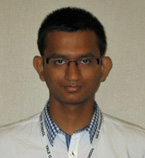
On December 19, 2019, Shantanu Mundhada successfully defended his thesis, “Hardware-efficient autonomous quantum error correction” (Advisor: Michel Devoret).
Mundhada explained “Quantum computers hold the promise of exponential speedup in certain information processing tasks. Currently, such a speedup cannot be achieved in a useful manner due to the errors developed in quantum systems as a result of unavoidable interaction with the environment. This makes quantum error correction (QEC) a vital area of research. A QEC protocol has three essential requirements: (i) redundant storage of information in higher-dimensional Hilbert space, (ii) error detection, and (iii) error mitigation. The vast majority of QEC protocols employ multiple finite dimensional systems to store information, and a measurement based, discrete feedback loop to detect and correct for the errors. Such a strategy invariably comes with a significant hardware and software overhead and limits the scalability of quantum computers. It is possible to eliminate the associated overhead by hardware-efficient encoding in infinite dimensional Hilbert spaces and error mitigation using autonomous feedback loop directly built into the quantum system. In this thesis, we develop and experimentally validate the crucial techniques required for the implementation of a hardware efficient and autonomous QEC protocol in the context of superconducting circuits. These superconducting circuits are one of the leading candidates for implementing quantum computers.
In particular, we focus on the Schrödinger cat code, which stores information using the infinite dimensional Hilbert space of a harmonic oscillator and allows for first order protection against all the possible errors. Autonomously stabilizing the decoherence free subspace for this code requires the harmonic oscillator to gain and loose photons in sets of four, that is, a four-photon driven-dissipative process. We propose a scheme for engineering such a process through a Raman-like cascading of readily available four-wave mixing interactions, and experimentally demonstrate the feasibility of this cascading. Furthermore, an improved four-wave mixing device that cancels unwanted, always-on interactions is studied. We also propose an implementation of a new error-correction code, the pair-cat code, which offers autonomous protection against all the error channels using low-order parametric interactions.”
Mundhada will join Quantum Circuit, Inc. as a Quantum Engineer.
Thesis Abstract: The promise of quantum speedup in information processing is not yet fulfilled in a useful quantum algorithm due to the susceptibility of quantum information to decoherence. This makes quantum error correction (QEC) a vital area of research. The vast majority of QEC protocols, however, come with an overwhelming hardware and software overhead. For superconducting quantum circuits, it is possible to minimize this overhead by hardware-efficient encoding in infinite dimensional Hilbert spaces of high-Q harmonic oscillators, and error mitigation using autonomous feedback. Autonomous quantum error correction (AQEC) is particularly challenging, since it requires specific nonlinear interactions between various modes of a quantum system. In this thesis, we explore the Hamiltonian engineering techniques, geared towards realizing the required interactions for a promising class of hardware efficient QEC codes, namely Schrödinger cat codes.
A four-component Schrödinger cat code, which allows for first-order protection against all error channels, requires a highly nonlinear four-photon driven-dissipative process for autonomous stabilization of the decoherence free manifold. We propose a scheme for engineering such a process through a Raman-assisted cascading of readily available four-wave mixing interactions, and experimentally demonstrate the feasibility of this cascading. Furthermore, an improved four-wave mixing device that cancels unwanted always-on interactions is studied. We also propose an implementation of a new error-correction code, the pair-cat code, which offers autonomous protection against all the error channels using low-order parametric interactions.